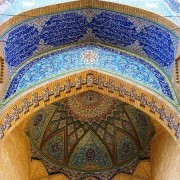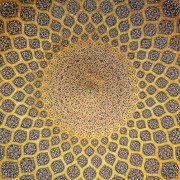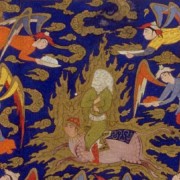Tradition and Modernity – Frithjof Schuon
Tradition and Modernity
by Frithjof Schuon
[This paper was originally written by Schuon for a congress convened in Japan in 1961, which dealt with the crisis of modernity. The text was subsequently published under the title “No Activity without Truth” in the Penguin anthology titled “The Sword of Gnosis” (edited by Jacob Needleman). A version of this paper formed the text of Schuon’s message to the Rothko Colloquium on “Contemplation and Action”, held at Rothko Chapel, in Huston, Texas, in July 1973, and was read to the participants by Seyyed Hossein Nasr.]
The purpose of this congress is of the most extreme importance, since it concerns, directly or indirectly, the destiny of mankind. In the face of perils of the modern world, we ask ourselves: What must we do? This is an empty question if it be not founded upon antecedent certainties, for action counts for nothing unless it be the expression of a knowing and also a manner of being. Before it is possible to envisage any kind of remedial activity, it is necessary to see things as they are, even if, as things turn out, it costs us much to do so; one must be conscious of those fundamental truths that reveal to us the values of proportions of things. If one’s aim is to save mankind, one must first know what it means to be a man; if one wishes to defend the spirit, one must know what is spirit. “Before doing, one must be,” says the proverb; but without knowing, it is impossible to do. “The soul is all that it knows,” as Aristotle said.
In our time one has often heard it said that in order to fight against materialism—or materialist pseudo-idealism—a new ideology is needed, one capable of standing up to all seductions and assaults. Now, the need for an ideology or the wish to oppose one ideology to another is already an admission of weakness, and anything undertaken on this basis is false and doomed to defeat. What must be done is to oppose truth purely and simply to the false ideologies, that same truth that has always been and that we could never invent for the reason that it exists outside us and above us. The present-day world is obsessed with “dynamism” as if this constituted a “categorical imperative” and a universal remedy and as if dynamism had any meaning or positive efficacy outside truth.
No man in his senses can have the intention of merely substituting one error for another, whether “dynamic” or otherwise; before speaking of force and effectiveness one must therefore speak of truth and nothing else. A truth is powerful in measure as we assimilate it; if the truth does not confer on us the strength of which we stand in need, this only goes to prove that we have not really grasped it. It is not for truth to be dynamic, but for ourselves to be dynamic in function of a true conviction. That which is lacking in the present world is a profound knowledge of the nature of things; the fundamental truths are always there, but they do not impose themselves in actual practice because they cannot impose themselves on those who are unwilling to accept them.
It is obvious that here we are concerned, not with the quite external data with which experimental science can possibly provide us, but with realities which that science does not and indeed cannot handle and which are transmitted through quite a different channel, that of mythological and metaphysical symbolism. The symbolical language of the great traditions of mankind may indeed seem arduous and baffling to some minds, but it is nevertheless perfectly intelligible in the light of the orthodox commentaries; symbolism—this point must be stressed—is a real and rigorous science, and nothing can be more naive than to suppose that its apparent naivety springs from an immature and “prelogical” mentality. This science, which can properly be described as “sacred,” quite plainly does not have to adjust itself to the modern experimental approach; the realm of revelation, of symbolism, of purse and direct intellection, stands in fact above both the physical and the psychological realms, and consequently, it lies beyond the scope of so-called scientific methods. If we feel we cannot accept the language of traditional symbolism because to us it seems fanciful and arbitrary, this shows we have not yet understood that language, and certainly not that we have advanced beyond it.
Nothing is more misleading than to pretend, as is so glibly done in our day, that the religions have compromised themselves hopelessly in the course of centuries or that they are now played out. If one knows what a religion really consists of, one also knows that the religions cannot compromise themselves and that they are independent of human doings; in fact, nothing men do is able to affect the traditional doctrines, symbols, or rites. The fact that a man may exploit religion in order to bolster up national or private interests in no wise affects religion as such. In Japan, Shinto, for example, was latterly made to serve political ends, but it was in no wise compromised in itself by this fact, nor could it be. Its symbols, rites, traditions, moral code, and doctrine remain what they always were, from the “Divine Epoch” down to our own times; and as for an exhausting of the religions, one might speak of this if all men by now become saints or Buddhas. In that case only could it be admitted that the religions were exhausted, at least as regards their forms.
Tradition speaks to each man the language he can comprehend, provided he wishes to listen. The latter proviso is crucial, for tradition, let it be repeated, cannot “become bankrupt”; rather is it of the bankruptcy of man that one should speak, for it is he that has lost all intuition of the supernatural. It is man who has let himself be deceived by the discoveries and inventions of a falsely totalitarian science; that is to say, a science that does not recognize its own proper limits and for that same reason misses whatever lies beyond those limits.
Fascinated alike by scientific phenomena and by the erroneous conclusions he draws from the, man has ended by being submerged by his own creations; he will not realize that a traditional message is situated on quite a different plane or how much more real that plane is, and he allows himself to be dazzled all the more readily since scientism provides him with all the excuses he wants in order to justify his own attachment to the world of appearance and to his ego and his consequent flight from the presence of the Absolute.
People speak of a duty to make oneself useful to society, but they neglect to ask the question whether that society does or does not in itself possess the usefulness that a human society normally should exhibit, for if the individual must be useful to the collectivity, the latter for its part must be useful to the individual, and one must never lose sight of the fact that there exists no higher usefulness than that which envisages the final ends of man. By its divorce from traditional truth—as primarily perceivable in that “flowering forth” that is revelation—society forfeits its own justification, doubtless not in a perfunctorily animal sense, but in the human sense. This human quality implies that the collectivity, as such, cannot be the aim and purpose of the individual but that, on the contrary, it is the individual who, in his “solitary stand” before the Absolute and in the exercise of his supreme function, is the aim of purpose of collectivity. Man, whether he be conceived in the plural or the singular, or whether his function be direct or indirect, stands like “a fragment of absoluteness” and is made for the Absolute; he has no other choice before him. In any case, one can define the social in terms of truth, but one cannot define truth in terms of the social.
Reference is often made to the “selfishness” of those who busy themselves with salvation, and it is said that instead of saving oneself one ought to save others; but this is an absurd kind of argument, since either it is impossible to save others, or else it is possible to save them but only in virtue of our own salvation or of our own effort toward salvation. No man has ever done a service to anyone else whatsoever by remaining “altruistically” attached to his own defects. He who is capable of being a saint but fails to become such certainly will save no one else; it is sheer hypocrisy to conceal one’s own weakness and spiritual lukewarmness behind a screen of good works believed to be indispensable and of absolute value.
Another error, closely related to the one just pointed out, consists in supposing that contemplative spirituality is opposed to action or renders a man incapable of acting, a belief that is belied by all the sacred scriptures and especially by the Bhagavad-gita. In Japan the example of saints such as Shotoku Taishi, Hojo Tokimune, Shinran Shonin, and Nichiren proves—if proof is needed—that spirituality is neither opposed to action nor dependent upon it, and also that spirituality leads to the most perfect action whenever circumstances require it, just as it can also, if necessary, turn away from the urge to action when no immediate aim imposes the need for it.
To cut off man from the Absolute and reduce him to a collective phenomenon is to deprive him of all right to existence qua man. If man deserves that so many efforts should be spent on his behalf, this cannot be simply because he exists, eats, and sleeps or because he likes what is pleasant and hates what is unpleasant, for the lowest of the animals are in similar case without being considered for this reason our equals and treated accordingly. To the objection that man is distinguished from the animal by his intelligence, we will answer that it is precisely this intellectual superiority that the social egalitarianism of the moderns fails to take into account, so much so that an argument that is not applied consistently to men cannot then be turned against the animals. To the objection that man is distinguished from animals by his “culture” we will answer that the completely profane and worldly “culture” in question is nothing more than a specifically dated pastime of the human animal; that is to say, this culture can be anything you please, while waiting for the human animal to suppress it altogether. The capacity for absoluteness that characterizes human intelligence is the only thing conferring on man a right of primacy; it is only this capacity that gives him the right to harness a horse to a cart. Tradition, by its above-worldly character, manifests the real superiority of man; tradition alone is a “humanism” in the positive sense of the word. Antitraditional culture, by the very fact that it is without the sense of the Absolute and even the sense of truth—for these two things hang together—could never confer on man that unconditional value and those indisputable rights that modern humanitarianism attributes to him a priori and without any logical justification.
The same could also be expressed in another way: When people speak of “culture,” they generally think of a host of contingencies, of a thousand ways of uselessly agitating the mind and dispersing one’s attention, but they do not think of that principle that alone confers lawfulness on human works; this principle is the transcendent truth, whence springs all genuine culture. It is impossible to defend a culture effectively—such as the traditional culture of Japan, which is one of the most precious in the world—without referring it back to its spiritual principle and without seeking therein the sap that keeps life going. Agreement as between cultures means agreement on spiritual principles; for truth, despite great differences of expression, remains one.
Many people of our time reason along the following lines: The religions—or the differing spiritual perspectives within a given religion—contradict one another, therefore they cannot all be right; consequently none is true. This is exactly as if one said: Every individual claims to be “I,” thus they cannot all be right; consequently none is “I.” This example shows up the absurdity of the antireligious argument, by recalling the real analogy between the inevitable external limitation of religious language and the no less inevitable limitation of the human ego. To reach this conclusion, as do the rationalists who use the above argument, amounts in practice to denying the diversity of the knowing subjects as also the diversity of aspects in the object to be known. It amounts to pretending that there are neither points of view nor aspects; that is to say, that there is but a single man to see a mountain and that the mountain has but a single side to be seen. The error of the subjectivist and relativist philosophers is a contrary one. According to them, the mountain would alter its nature according to whoever viewed it; at one time it might be a tree and at another a stream. Only traditional metaphysics does justice both to the rigour of objectivity and to the rights of subjectivity; it alone is able to explain the unanimity of the sacred doctrines as well as the meaning of their formal divergencies.
In sound logic, to observe the diversity of religions should give rise to the opposite conclusion, namely: Since at all periods and among all peoples religions are to be found that unanimously affirm one absolute and transcendent reality, as also a beyond that receives us according to our merit or knowledge—or according to our demerit and ignorance—there is reason to conclude that every religion is right, and all the more so since the greatest men have walked the earth have borne witness to spiritual truths. It is possible to admit that all the materialists have been mistaken, but it is not possible to admit that all the founders of religions, all the saints and sages, have been in error and have led others into error; for one had to admit that error lay with them and not with those who contradicted them, mankind itself would cease to offer any interest, so that a belief in progress or in the possibility of progress would become doubly absurd. If the Buddha or Christ or a Plotinus or a Kobo Daishi were not intelligent, then no one is intelligent, and there is no such thing as human intelligence.
The diversity of religions, far from proving the falseness of al the doctrines concerning the supernatural, shows on the contrary the supraformal character or revelation and the formal character of ordinary human understanding; the essence of revelation—or enlightenment—is one, but human nature requires diversity. Dogmas or other symbols may contradict one anther externally, but they concur internally.
Howbeit, it is easy to foresee the following objection: Even if it be admitted that there is a providential and inescapable cause underlying the diversity of religions and even their exoteric incompatibility in certain cases, ought we not then to try to get beyond these differences by creating a single universal religion? To this it must be answered first that these differences have at all times been transcended in the various esotericism and second that a religion is not something one can create for the asking. Every attempt of this kind would be an error and a failure, and this is all the more certain inasmuch as the age of the great revelations had closed centuries ago. No new religion can see the light of day in our time for the simple reason that time itself, far from being a sort of uniform abstraction, on the contrary alters its value according to every phase of its development. What was still possible a thousand years ago is so no longer, for we are now living in the age known to Buddhist tradition as “the latter times.” However, what we are able to do and must do is to respect all of the religions—but without any confusing of forms and without asking to be fully understood by every believer—while waiting till heaven itself wills to unite those things that now are scattered. For we find ourselves on the threshold of great upheavals, and what man himself has neither the power nor the right to realize will be realized in heaven, when the time for it shall be ripe.
The world is full of people who complain that they have been seeking but have not found; this is because they have not known how to seek and have only looked for sentimentalities of an individualistic kind. One often hears it said that the priests of such and such a religion are no good or that they have brought religion itself to naught, as if this were possible or as if a man who serves his religion badly did not betray himself exclusively; men quite forget the timeless value of symbols and of the graces they vehicle. The saints have at all times suffered from the inadequacy of certain priests; but far from thinking of rejecting tradition itself for that reason, they have by their own sanctity compensated for whatever was lacking in the contemporary priesthood. The only means of “reforming” a religion is to reform oneself. It is indispensable to grasp the fact that a rite vehicles a far greater value than a personal virtue. A personal initiative that takes a religious form amounts to nothing in the absence of a traditional framework such as alone can justify that initiative and turn it to advantage, whereas a rite at least will always keep fresh the sap of the whole tradition and hence also its principal efficacy—even if men do not know how to profit thereby.
If things were otherwise or if spiritual values were to be found outside the sacred traditions, the function of the saints would have been, not to enliven their religion, but rather to abolish it, and there would no longer be any religion left on earth, or else on the contrary there would be religions by the million, which amounts to the same things; and these millions of personal pseudo-religions would themselves be changing at every minute. The religions and their orthodox developments—such as the various traditional schools of Buddhism—are inalienable and irreplaceable legacies to which nothing essential can be added and from which nothing essential can be subtracted. We are here, not in order to change these things, but in order to understand them and realize them in ourselves.
Today two dangers are threatening religion: from the outside, its destruction—were it only as a result of its general desertion—and from the inside, its falsification. The latter, with its pseudo-intellectual pretensions and its fallacious professions of “reform,” is immeasurably more harmful than all the “superstition” and “corruption” of which, rightly or wrongly, the representatives of the traditional patrimonies have been accused; this heritage is absolutely irreplaceable, and in the face of it men as such are of no account. Tradition is abandoned, not because people are no longer capable of understanding its language, but because they do not wish to understand it, for this language is made to be understood till the end of the world; tradition is falsified by reducing it to flatness on the plea of making it more acceptable to “our time,” as if one could—or should—accommodate truth to error. Admittedly, a need to reply to new questions and new forms of ignorance can always arise. One can and must explain the sacred doctrine, but not at the expense of that which gives it its reason for existing, that is to say, not at the expense of its truth and effectiveness. There could be no question, for instance, of adding to the Mahayana or of replacing it be a new vehicle, such as would necessarily be of purely human invention; for the Mahayana—or shall we say Buddhism?—is infinitely sufficient for those who will give themselves the trouble to look higher than their own heads.
One point that has been already mentioned is worth recalling now because of its extreme importance. It is quite out of the question that a “revelation,” in the full sense of the word, should arise in our time, one comparable, that is to say, to the imparting of one of the great sutras or any other primary scripture; the day of revelations is past on this globe and was so already long ago. The inspirations of the saints are of another order, but these could in any case never falsify or invalidate tradition or intrinsic orthodoxy by claiming to improve on it or even replace it, as some people have suggested. “Our own time” possesses no quality that makes it the measure or the criterion of values in regard to that which is timeless. It is the timeless that, by it very nature, is the measure of our time, as indeed of all other times; and if our time has no place for authentic tradition, then it is self-condemned by that very fact. The Buddha’s message, like every other form of the one and only truth, offers itself to every period with an imperishable freshness. It is as true and as urgent in our day as it was two thousand years ago; the fact that mankind finds itself in the “latter days,” the days of forgetfulness and decline, only makes that urgency more actual than ever. In fact, there is nothing more urgent, more actual, or more real than metaphysical truth and its demands. It alone can of its own right fill the vacuum left in the contemporary mentality—especially where young people are concerned—by social and political disappointments on the one hand and by the bewildering and indigestible discoveries of modern science on the other. At the risk of repetition let the following point be stressed, for to doubt it would be fatal: To search for an “ideology” in the hopes of filling up that vacuum—as if it were simply a matter of plugging a hole—is truly a case of “putting the cart before the horse.” It is a case of subordinating truth and salvation to narrowly utilitarian and in any case quite external ends, as if the sufficient cause of truth could be found somewhere below truth. The sufficient cause of man is to know the truth, which exists outside and above him; the truth cannot depend for its meaning and existence on the wishes of man. The very word “ideology” shows that truth is not the principal aim people have in mind; to use that word shows that one is scarcely concerned with the difference between true and false and that what one is primarily seeking is a mental deception that will be comfortable and workable, or utilizable for purposes of one’s own choosing, which is tantamount to abolishing both truth and intelligence.
Outside tradition there can assuredly be found some relative truths or views of partial realities, but outside tradition there does not exist a doctrine that catalyses absolute truth and transmits liberating notions concerning total reality. Modern science is not a wisdom but an accumulation of physical experiments coupled with many unwarrantable conclusions; it can neither add nor subtract anything in respect of the total truth or of mythological or other symbolism or in respect of the principles and experiences of the spiritual life.
One of the most insidious and destructive illusions is the belief that depth psychology (or in other words psychoanalysis) has the slightest connection with spiritual life, which these teachings persistently falsify by confusing inferior elements with superior. We cannot be too wary of all these attempts to reduce the values vehicled by tradition to the level of phenomena supposed to be scientifically controllable. The spirit escapes the hold of profane science in an absolute fashion. It is not the positive results of experimental science that one is out to deny (always assuming that they really are positive in definite sense) by the absurd claim of science to cover everything possible, the whole of truth, the whole of the real; this quasi-religious claim to totality moreover proves the falseness of the point of departure. If one takes into account the very limited realm within which science moves, the least one can say is that nothing justifies the so-called scientific denials of the beyond and of the Absolute.
If it be essential to distinguish between the realm of religion or traditional wisdom and that of experimental science, it is also essential to distinguish between the intellect, which is intuitive, and reason, which is discursive; reason is a limited faculty, whereas intellect opens out upon the Universal and the Divine. For metaphysical wisdom, reason only possesses a dialectical, not an illuminative, usefulness; reason is not capable of grasping in a concrete way that which lies beyond the world of forms, though reason is able to reach further than imagination. All ratiocination condemns itself to ignorance from the moment it claims to deal with the roots of our existence and of our spirit.
We all know that the need to account for things in terms of causality, as felt by modern man, is apt to remain unsatisfied in the face of the ancient mythologies; but the fact is that attempts to explain the mythological order with the aid of reasonings that are necessarily arbitrary and vitiated by all sort of prejudices are bound to fail in any case. Symbolisms reveal their true meaning only in the light of the contemplative intellect, which is analogically represented in man by the heart and not by the brain. Pure intellect—or intuition and suprarational intelligence—can flower only in the framework of a traditional orthodoxy, by reason of the complementary and therefore necessary relationship between intellection and revelation.
The fundamental intention of every religion or wisdom is the following: first, discernment between the real and the unreal, and then concentration upon the real. One could also render this intention otherwise: truth and the way, prajnâ and upâya, doctrine and its corresponding method. One must know that the Absolute or the Infinite—whatever may be the names given it by respective traditions—is what gives sense to our existence, just as one must know that the essential content of life is the consciousness of this supreme reality, a fact that explains the part to be played by continual prayer; in a word we live to realize the Absolute. To realize the Absolute is to think of it, under one form or another as indicated by revelation and tradition, by a form such as the Japanese nembutsu or the Tibetan Om mani padme hum or the Hindu japa-yoga, not forgetting the Christian and Islamic invocations, such as the Jesus Prayer and the dhikr of the dervishes. Here one will find some very different modalities, not only as between one religion and another but also within the fold of each religion, as can be shown, for instance, by the difference between Jodo Shinshu and Zen. However this may be, it is only on the basis of a genuine spiritual life that we can envisage any kind of external action with a view to defending truth and spirituality in the world.
All the traditional doctrines agree in this: From a strictly spiritual point of view, though not necessarily from other much more relative and therefore less important points of view, mankind is becoming more and more corrupted; the ideas of “evolution,” or “progress,” and of a single “civilization” are in effect the most pernicious pseudo-dogmas the world has ever produced, for there is no newfound error that does not eagerly attach its own claims to the above beliefs. We say not that evolution is nonexistent, but that it has a partial and most often a quite external applicability; if there be evolution on the one hand, there are degenerations on the other, and it is in any case radically false to suppose that our ancestors were intellectually, spiritually, or morally our inferiors. To suppose this is the most childish of “optical delusions”; human weakness alters its style in the course of history, but not its nature. A question that now arises is as follows: Seeing that humanity is decaying inescapably and seeing that the final crisis with its cosmic consummation as foretold in the sacred books is inevitable, what then can we do? Does an external activity still have any meaning?
To this it must be answered that an affirmation of the truth, or any effort on behalf of truth, is never in vain, even if we cannot from beforehand measure the value of the outcome of such an activity. Moreover we have no choice in the matter. Once we know the truth, we must live in it and fight for it; but what we must avoid at any price is to let ourselves bask in illusions. Even if, at this moment, the horizon seems as dark as possible, one must not forget that in a perhaps unavoidably distant future the victory is ours and cannot but be ours. Truth by its very nature conquers all obstacles: Vincit omnia veritas.
Therefore, every initiative taken with a view to harmony between the different cultures and for the defense of spiritual values is good, if it has as its basis a recognition of the great principal of truths and consequently also a recognition of tradition or of the traditions.
“When the inferior man hears talk about Tao, he only laughs at it; it would not be Tao if he did not laugh as it … the self-evidence of Tao is taken for a darkness.” These words of Lao-tse were never more timely than now. Errors cannot but be, as long as their quite relative possibility has not reached its term; but for the Absolute errors have never been and never shall be. On their own plane they are what they are, but it is the Changeless that shall have the final say.









